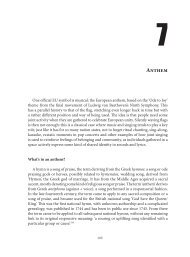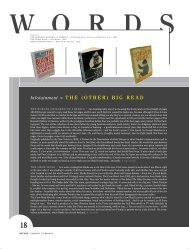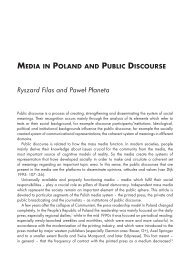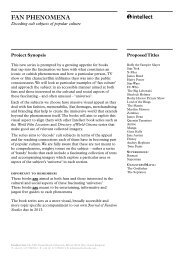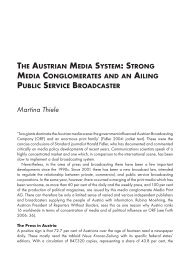Andrea Czepek, Melanie Hellwig and Eva Nowak - Intellect
Andrea Czepek, Melanie Hellwig and Eva Nowak - Intellect
Andrea Czepek, Melanie Hellwig and Eva Nowak - Intellect
You also want an ePaper? Increase the reach of your titles
YUMPU automatically turns print PDFs into web optimized ePapers that Google loves.
244 | PRESS FREEDOM AND PLURALISM IN EUROPE<br />
foreigners acquired German citizenship). Not being German citizens weakens the minorities’<br />
position with regard to dem<strong>and</strong>ing better representation in politics as well as in the media.<br />
Conclusion<br />
The press <strong>and</strong> other media can act largely independently from state <strong>and</strong> government influence.<br />
German legislation safeguards this independence <strong>and</strong> the jurisdiction has usually regarded<br />
freedom of the press highly. But freedom of the press in Germany is mainly seen as a<br />
commercial freedom, largely disregarding economic pressures which potentially inhibit free,<br />
pluralistic information <strong>and</strong> opinion forming. As the examples have shown, concentration of<br />
ownership is increasing in the print media market, where growing regional monopolies have<br />
formed <strong>and</strong> in many areas, local <strong>and</strong> regional information is only available from one source.<br />
In the broadcasting sector, which is also highly concentrated, a shift towards emphasizing<br />
economic objectives can also be observed, especially in the private-commercial media, which<br />
are gaining ground in terms of viewers, especially among young people. The dominance<br />
of market mechanisms in the media may allow for institutional media freedom, but it puts<br />
individual journalistic freedoms increasingly under pressure because of a lack of resources for<br />
investigative reporting, journalistic autonomy <strong>and</strong> precarious working conditions. With regard<br />
to media legislation, there have been some favourable (freedom of information act) <strong>and</strong> some<br />
less favourable developments (legalization of online searches, data retention). In the political<br />
realm, the EU deregulation policies have been very influential – ironically, by trying to lift<br />
(perceived) state influence on the media market, such measures actually pose a threat to press<br />
freedom <strong>and</strong> plurality because they challenge the diversity approach of public service media<br />
<strong>and</strong> endanger the possibilities for representation, access <strong>and</strong> participation by societal groups<br />
without buying power or lobbying influence.<br />
Notes<br />
1. Deutsche Telekom is the largest telecommunications provider in Germany <strong>and</strong> one of the largest in<br />
Europe. It was privatized in 1990 but the federal state of Germany still owns 14.83 per cent of the<br />
shares (September 2007), another 16.87 per cent are held by the state-owned KfW-Bank. Telekom<br />
generated a gross income of 2.5 billion Euros in 2007 <strong>and</strong> employs 242,000 people worldwide<br />
(Deutsche Telekom AG 2008).<br />
2. The so called telecommunications data retention act is based on an EU regulation dem<strong>and</strong>ing<br />
the storage of telecommunications connection data for the purpose of criminal investigations <strong>and</strong><br />
terrorism prevention. However, trade organizations have already claimed interest in the data, for<br />
example the music industry has voiced the opinion that the data could be used to track down<br />
copyright offenders. This in turn raises fears that the usage of the data, once generated <strong>and</strong> stored,<br />
could go far beyond terrorism investigations. The German law which is currently contested in the<br />
supreme court <strong>and</strong> not yet enacted (while the data is already being stored regardless, just in case),<br />
goes beyond the EU regulation in that it would allow usage of the data for all criminal investigations,<br />
not just ‘severe crime’ (heise online 2007; Rath 2007; spiegel online 2007).<br />
3. The law on online searches still has to be approved by the parliament, which is expected for<br />
November 2008. In February 2008, the Supreme Court had rejected a previous proposal which<br />
it considered not constitutional. The online searches are supposed to be conducted online by<br />
implementing a Trojan virus on the ‘targets’ computer.



